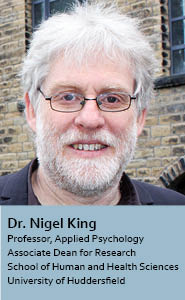Dr. Nigel King
Title – Still going “Back to the things themselves”: The value of considering personal experience in health professional education research

Date: Wednesday, September 23, 2015*
*Take note this session is one week later than the usual timing for CHES Research Rounds
Time: 12:00pm to 1:30pm (Lunch will be served at DHCC)
Locations:
- SHY E409
- Diamond Health Care Centre 2267
- IRC 305
- MSB 107
- RJH CA 120
- KGH CAC 237
- NHSC 9-374
- Surrey Central City (Manning Room 4109)
Abstract
A century ago Edmund Husserl, the founder of phenomenology, called for a return to “the things themselves”. He was concerned that science was too eager to progress by building hypotheses upon abstract theories without properly considering the nature of the phenomena under consideration. In these rounds I want to echo Husserl’s call and argue for the importance of the systematic study of lived experience in health professional education research. (I define ‘experiential approaches’ more broadly than just phenomenology to also include, for example, some narrative and constructivist methods.) I will outline key features of such approaches, and discuss some of the methods of data collection and analysis that can be used within them. Throughout I will draw on examples from a range of projects in areas including: learning from placements, patient experiences of medical student teaching encounters, and nursing students and lecturers’ understandings of ‘self-directed’ study time. In keeping with a session that advocates the primacy of experience, there will be an element of audience participation.
Biography
Professor Nigel King is Director of the Centre for Applied Psychological and Health Research and Professor in Applied Psychology in the School of Human and Health Sciences, University of Huddersfield, and Associate Dean for Research. He is also a Visiting Fellow at the Newcastle Business School, University of Northumbria.
Professor King has a background in both organizational and health psychology, and his empirical work has mostly been in primary/community health settings. His substantive interests include collaborative working, organizational innovation and change, connection to nature and its impact on well-being, and student experiences of placement learning. However, Professor King is probably betst known for his methodological work, developing qualitative methods for applied research. These include the Template Analysis style of thematic analysis and the Pictor technique – a visual method for exploring experiences of collaborative working. He is the author (with Christine Horrocks) of Interviews in Qualitative Research (Sage, 2010), and the forthcoming Template Analysis for Business and Management Students (Sage, 2015).
Accreditation:
As an organization accredited to sponsor continuing medical education for physicians by the Committee on Accreditation of Continuing Medical Education (CACME), the UBC Division of Continuing Professional Development designates this educational program as meeting the accreditation criteria of the College of Family Physicians of Canada for up to 1.5 Mainpro-M1 credits. This program has been reviewed and approved by UBC Division of Continuing Professional Development. Each physician should claim only those credits he/she actually spent in the activity.
